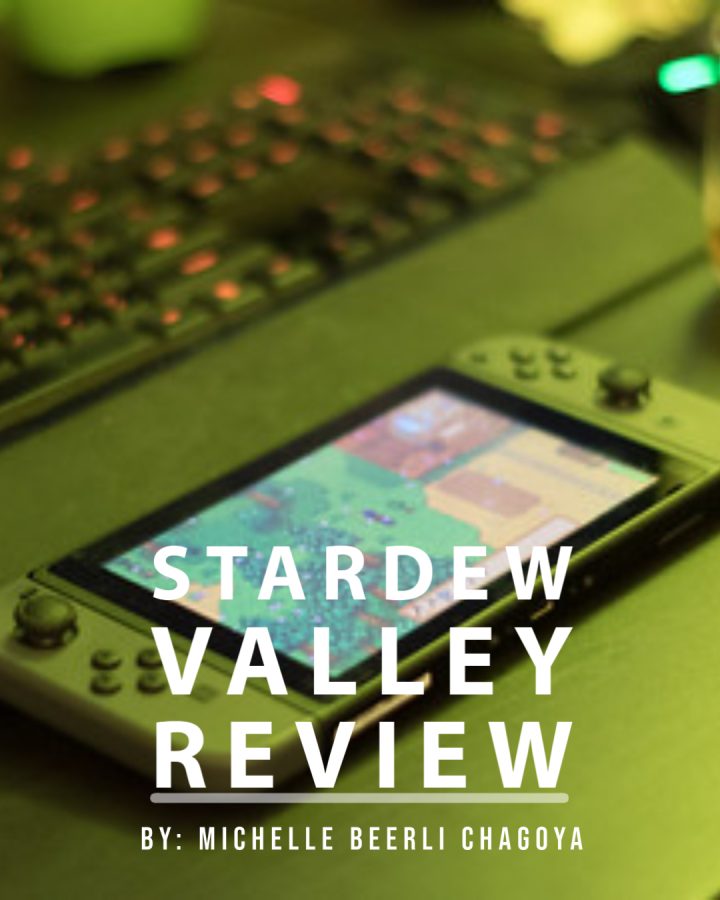Stardew Valley Review
Stardew Valley impresses as a fun and engaging farming simulator
March 18, 2021
During these virus ridden times many of us are seeking forms of escapism, whether that be through television shows, movies, or video games. Video games offer an immersive experience that is essentially unique. Through video games, the player has the ability to control the environment that surrounds them, creating a mental diversion from the unpleasant aspects of daily quarantine life.
One such game is Stardew Valley, which combines farm simulation with role playing game elements to create an intriguing, absorbing rural world.
The game begins with a final conversation with the player’s dying grandfather, who leaves the player a farm far away from their miserable corporate office job. The farm plot is overgrown. The player is armed with hand-me-down tools and a few coins, then they set out to begin their new life.
“Sometimes I feel like the game pushes me to be a more social person,” said senior Sebastian Chagoya. “It has taught me to enjoy the subtleties in dialogue, and to feel grateful for other people’s company and affection.”
The overarching goal of Stardew Valley appears to be restoring the community center: once the town’s most vibrant hub of activity. However, that is far from the truth, repairing it is merely the beginning. The valley is full of opportunities and it’s easy to get lost in the game for hours. Each path chosen by each player has purpose and detail, meaning that there’s a lot to do and a lot of ways to play; however, in Stardew Valley, there’s no wrong or right way to play.
“It’s a very charming and relaxing game,” said Chagoya. “It works for whichever game style you prefer- whether you are an intense, planning completionist, or someone who wants to lay back and let the game’s charm touch their heart. It has something for everyone and I think it’s a great example of what a great video game can achieve.”
Completing even the smallest tasks gives the player a sense of accomplishment and keeps the player digging to find more things to do. Some tasks are more engaging than others, farming specifically becomes a grind when the player has to water every plant individually, but the game rewards them with upgrades as they level up their farming level, rewarding them with the opportunity to make it almost fully automated.
Although the premise may sound mundane and repetitive, the developer made sure to fill this game to the brim with small details and secrets to keep the player entertained.
An example being the “Statue of Perfection,” which is unlocked in the late game portion of the game, only obtained by completing every aspect of the game to the fullest. Once you obtain it, you feel like you’ve earned it; it’s a badge of honor you worked for and deserve.
Chagoya, who is working to obtain true perfection expresses, “most of the time I feel happy with what I’ve discovered in a game. I feel like what I’ve experienced in the game is as much as I need out of it. In this case though, I feel some form of commitment. First of all, there are a lot of perks that come with completion, which is the summit event and the statue of True Perfection. But I also feel like I owe it to the game to complete it. Most games have some point where the game is done, and doing anything further is just being extra. I feel like this game isn’t done until it’s truly done: Until I achieve True Perfection. It’s just part of the natural progression of it. You don’t have to go on endless side quests, simply playing the game leads towards True Perfection.”
Stardew Valley emphasizes what you do with what you’re given and how you choose to build your community and relationships. Building a farm isn’t just a physical task, but an emotional one too. No simulation or game is an exact copy of what it’s trying to emulate, but Stardew Valley, above all, expertly explores the connection that an individual can have with their environment, their work, and the people around them.

